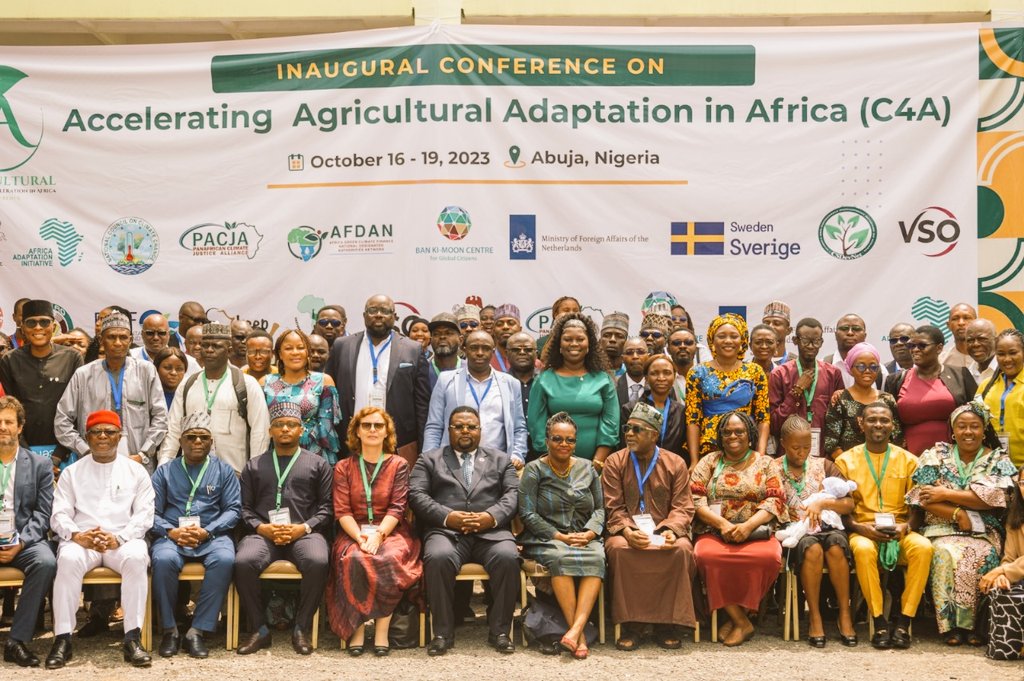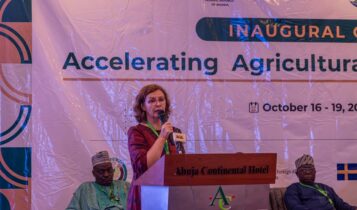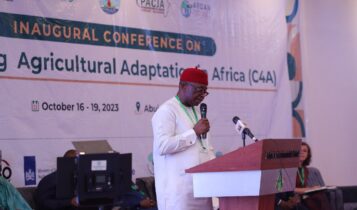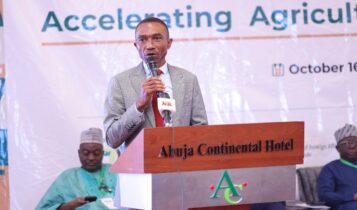
The Pan African Climate Justice Alliance (PACJA) in collaboration with the designated national platform in Nigeria, Climate and Sustainable Development Network (CSDevNet), and the National Council on Climate Change (NCCC) of the Federal Republic of Nigeria, hosted the Inaugural Conference on Accelerating Agricultural Adaptation in Africa (C4A) from the 16th to the 18th of October 2023 in Abuja, Nigeria.
The conference aimed to assess the state of the agriculture sector in Africa amidst climate change and devise strategies and approaches to accelerate political commitment and action to strengthen the adaptive capacities and resilience of Africa’s agriculture sector.
Participants included change-makers, policymakers, CSOs, NGOs, and private organisations from across Africa, including Nigeria, Senegal, Burkina Faso, Kenya, Sierra Leone, Niger, Uganda, Liberia, Botswana, Ghana, Zambia, and Burundi.
Giving his opening remarks, Prof. Ibrahim Choji, Chairman of the Board of Trustees at CSDevNet, highlighted the importance of the conference in addressing agricultural adaptation in Africa and welcomed all participants.
“There is a need to accelerate agricultural adaptation in Africa due to the far-reaching consequences of climate change not only in the environment but also on agriculture,” emphasized Prof. Choji.
“Africa being the cradle of humanity is home to diverse ecosystems and culture and is most affected by climate change. The continent is most vulnerable to the impacts of changing climate, at the same time, Africa has immense potential for innovative and resilient agricultural practices,” he said.

The Board Chair mentioned that the conference represented a beacon of hope in these challenging times and signified the realisation that as a collective force, the government, NGOs and Private organisations, must address the most imperative of adaptation and sustainable development. He therefore welcomed all participants to the event.
Speaking further, Dr. Salisu Dahiru, DG of NCCC, commended the roles PACJA had played in mobilising civil societies in Africa and discussed the challenges posed by climate change with emphasis on the need for adaptation in agricultural strategies.
The DG also made reference to UNFCCC, stating that gender must form the formidable building block for all climate change actions including adaptation.
Reiterating on the importance of the conference, Dr. Salisu mentioned that it will help present African voices and drive messages for many of the sectorial interventions that need to be done to help Nigeria, Africa and the world at large to cope with the issues of climate change.
“In the current administration of President Tinubu, attention is being paid to eight (8) priority areas that will propel Nigeria to greater prosperity. At the top of the 8-point agenda is food security which aims to feed the populace that guarantees a healthy and vibrant economy,” said Dr. Salihu.
Prof. Anthony Nyong, a representative from the African Development Bank (AfDB), lay emphasis on the importance of engaging youths in agriculture for climate adaptation as he discussed various AfDB’s initiatives in supporting adaptation efforts.

“More than 40% of AfDB’s resources goes to climate change and 67% goes to adaptation finance. Africa Development Bank is strongly commitment to supporting the fight against climate through providing finance among other resources,” Prof. highlighted.
Dr. Rita, a representative of the World Bank, stressed the significance of policy development on climate change.
“The World Bank’s commitment to addressing climate change challenges in Africa is demonstrated by its financial estimate of $2.2 trillion that goes into climate change every year,” she said.
Hon. Samuel Onuigbo, National Climate Change Act 2021, in his welcome address called agriculture a lifeline for millions particularly women in Africa.
“Agriculture employs more than half of Africa’s workforce out of which smallholder farmers constitute about 60% of the population in low-income countries. The continent has about 60% of the world’s uncultivated arable land and agriculture accounts for between 30-40% of the GDP according to World Bank and AfDB reports,” he said.
As the champion of the 2021 climate change act in Nigeria, Hon. Samuel emphasized the urgency of agricultural adaptation amidst the enormous climate crises.

“Agriculture is important in achieving the sustainable development goals set out by AU vision 2063 and the UN agenda 2030. The intergovernmental panel on climate change (IPCC) warned that Africa would be at war with the unprecedented challenge from global climate change and will cause more frequent and intense heat waves, drought, severe flood and wildfire which is likely to impact 90% of the population,” he added.
According to Hon. Samuel, the climate change act 2021 serves as a beacon of hope in addressing the corporate challenges posed by climate change in the agriculture sector by promoting nature-based solutions, conservation and sustainable management of forests through which Nigeria is leading the way towards a more climate resilient future of agriculture.
Dr. Sam Ogallah, Senior Climate Change Advisor at African Union Commission (AUC), in his opening remark said that the AU agenda 2063 is keen on the issues of agricultural adaptation that aims to make Africa a prosperous, united and integrated continent.
“One of the ways to realise the AU agenda is through the implementation of strategic actions in relation to climate change and the agriculture sector,” said Dr. Sam.
“In view of this, the AU came up with the African Union Climate Change and resilience development strategy an action plan from 2022- 2032. And in 2022, the African heads of states adopted the recovery action plan 2021-2027,” he added.

“In the Africa Climate Change and Resilience Development Strategy and Action Plan 2022-2032, there are four strategic intervention area and No. 2 talks about the transformation of the Africa agricultural system with emphasis on accelerating practices in ways that will be climate compliant,” he concluded.
Mr. Xavier Muron, a Representative of France, said most of the country’s activities had at least 50% positive impacts on climate change. Although, the activities were more of mitigation than adaptation, they hope to make a shift from mitigation to adaptation. He also pledged the commitment of France to supporting climate change in Nigeria and Africa.
Dr. Sadiq Wanka, Representative of the Vice President of Nigeria, began his remark by showing his delight to be part of the first agricultural adaptation conference in Africa which coincidentally falls on the day on the world food day, a timely opportunity to discuss the adverse impacts of climate change on the agriculture sector in Africa.
“95% of Africa’s agriculture is rainfed and the erratic rainfall pattern has a direct impact on food production in Africa. According to recent IPCC reports, warning projections indicate that extensive areas of Africa will exceed 2o Celsius by the last two decades of this century. The report also indicates that land temperature of Africa will rise faster than the global land approach particularly in the more arid regions which translates to famine, drought etc.,” highlighted Dr. Sadiq.
Key recommendations developed from the conference were:
- Call for African governments to accelerate policy development and implementation concerning climate change and agricultural adaptation.
- Encourage the creation of legal frameworks for climate financing, NDC alignment, and national adaptation financing frameworks.
- Promote youth and women involvement in agriculture through education, training, and financial support.
- Establish mentorship programs and platforms for youth and women in agricultural sectors.
- Support community-based adaptation strategies, including biofertilizer production, indigenous knowledge preservation, and agrobiodiversity conservation.
- Encourage the adoption of agroecology for food security, with financial support and provision of seeds and bio inputs to farmers.
- Strengthen international cooperation for climate justice, emphasising Africa’s demands in global climate negotiations.
- Advocate for consistent adaptation strategies, proper allocation of resources, and direct investments in climate-resilient agricultural practices.
- Increase investments in research and innovation for climate-smart agriculture.
- Promote the use of local knowledge and resources in developing innovative solutions for climate-related challenges in agriculture.
- Encourage continuous dialogue and collaboration among governments, NGOs, private organisations, and communities for effective climate adaptation in agriculture.
- Foster partnerships between governments and international organisations to mobilise funds and resources for agricultural adaptation projects.
The inaugural conference provided an inclusive platform for discussions, resolutions and recommendations made in view of accelerating agricultural adaptation in Africa. And the shared insights and proposed actions serve as valuable guidelines for addressing the challenges of climate change and promoting sustainable agriculture in Africa.
